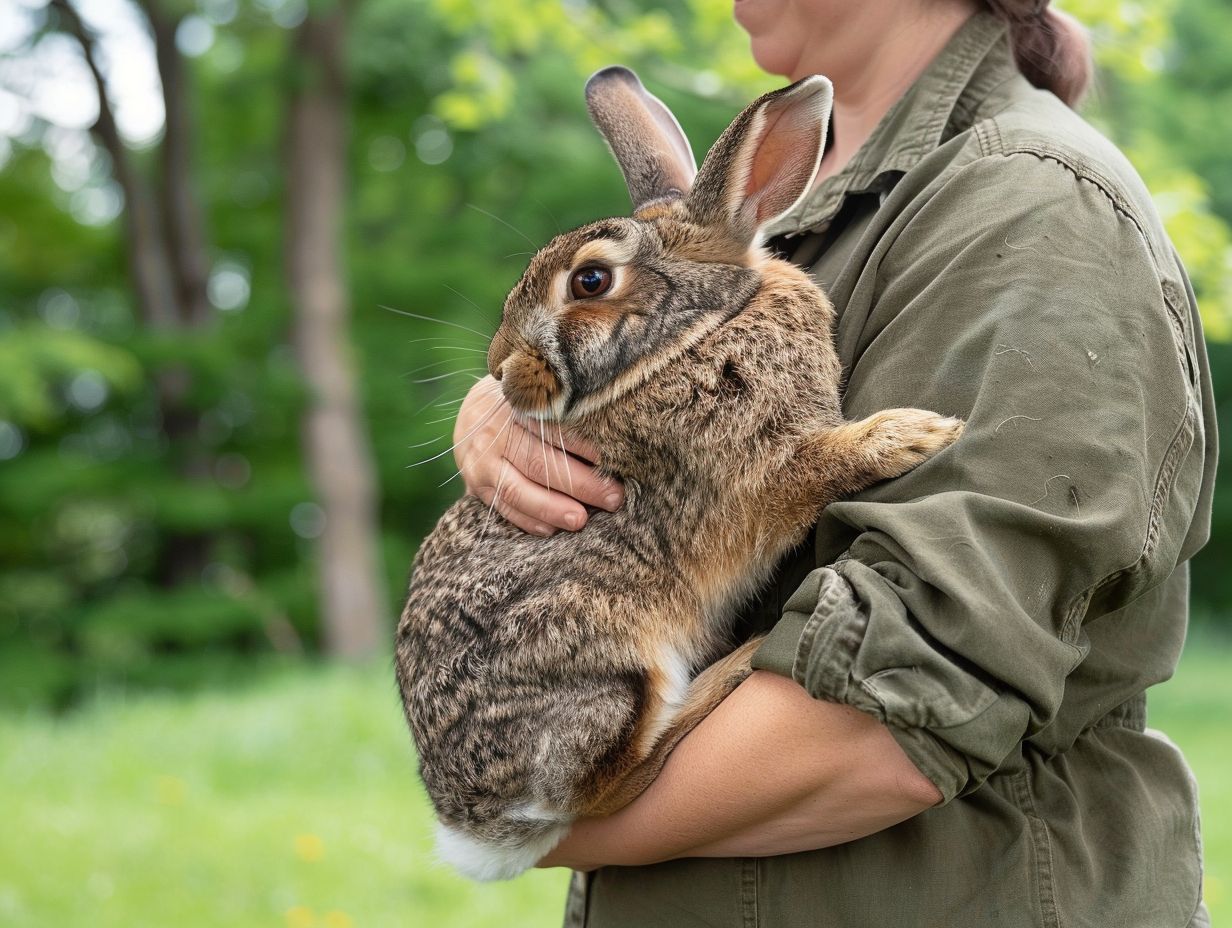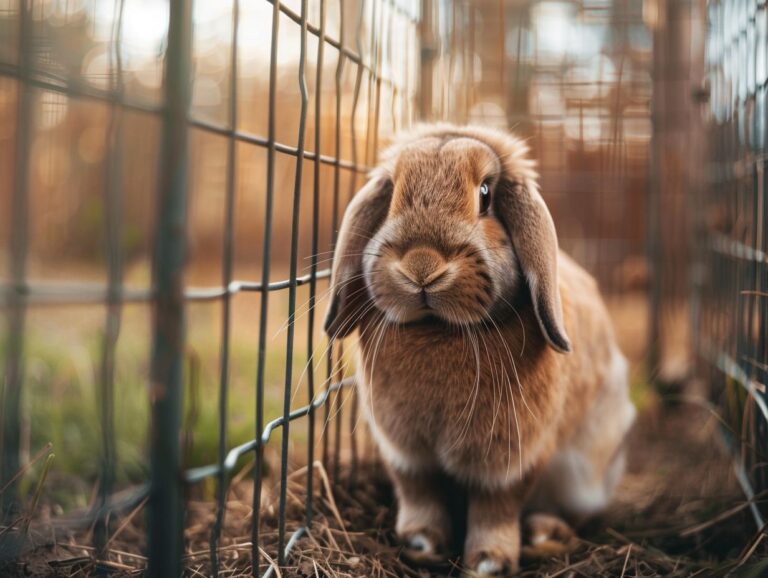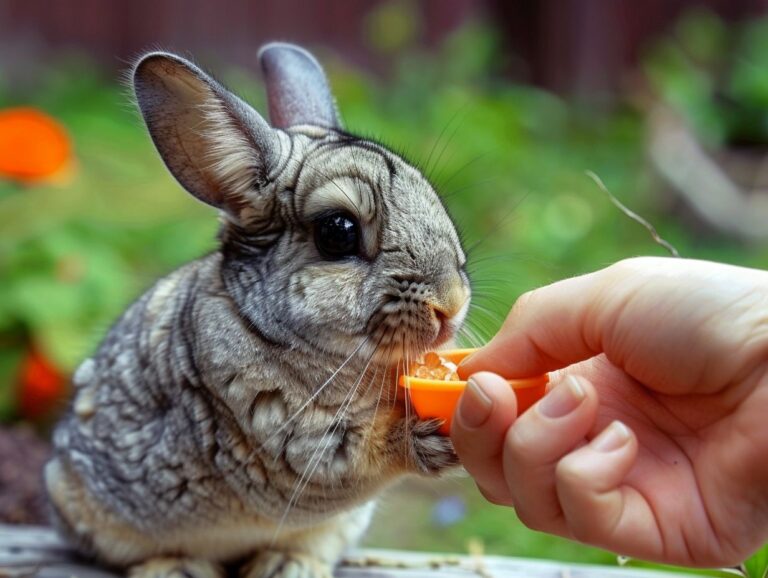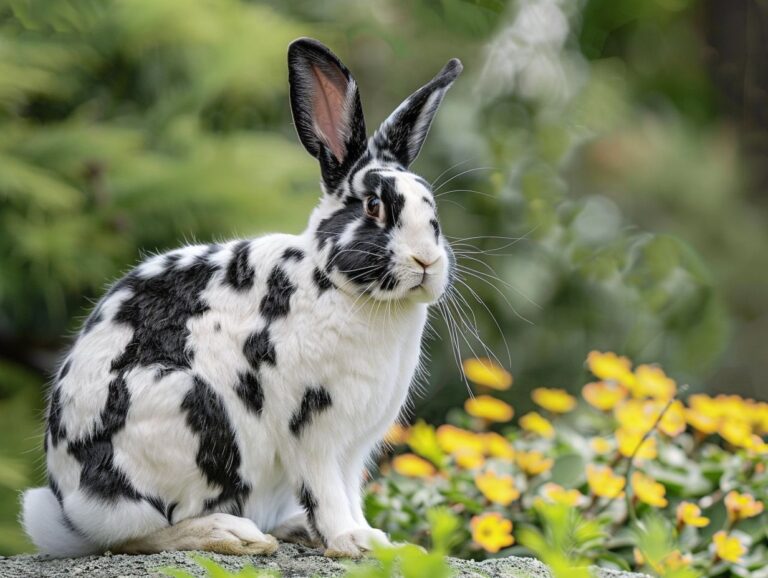Continental Giant Conti Rabbits As Pets: Care, Diet, and Health For Giant Sized Breeds
Are you interested in owning a unique and giant-sized rabbit breed as a pet?
Giant Chinchilla rabbits, also known as Contis, are a popular choice for those looking for a large and affectionate companion.
In this article, we will explore the characteristics of Continental Giant Rabbits, how to care for them, what their diet should consist of, common health issues to watch out for, and tips on keeping them healthy and happy.
Let’s dive into the world of these fascinating giant rabbits!
Key Takeaways:
What Is a Continental Giant Rabbit?
A Continental Giant Rabbit is a breed known for its impressive size and distinctive characteristics.
Originating from Belgium in the 16th century, these rabbits were initially bred for their large size and meat quality. They gained popularity for their gentle temperament and unique appearances. The Continental Giant Rabbit is one of the largest rabbit breeds, often weighing between 16-25 pounds. Their long, muscular bodies and big, upright ears are some of the distinctive features that set them apart. Despite their size, they are known to be docile and friendly, making them popular as pets and show rabbits in the rabbit community.
What Are the Characteristics of a Continental Giant Rabbit?
Continental Giant Rabbits are known for their remarkable size, typically weighing over 11 pounds and having a lifespan of…
These rabbits can grow up to 2.5 feet long, making them one of the largest domestic rabbit breeds in the world. Despite their size, they are known to have gentle and docile temperaments, often making them wonderful pets for families. With proper care, these rabbits can live up to 5-7 years. Due to their friendly nature, Continental Giant Rabbits are often used in therapy programs to provide comfort and companionship to those in need. Their distinct appearance, with large ears and powerful hind legs, adds to their charm and appeal as beloved pets.
Size and Weight
The size and weight of a Continental Giant Rabbit set it apart from other rabbit breeds. These rabbits can grow to be significantly larger.
The growth patterns of Continental Giant Rabbits are quite impressive. From birth to maturity, these rabbits can reach sizes of up to 2.5 feet long and weigh between 16-25 pounds. Compared to smaller rabbit breeds like the Netherland Dwarf or Mini Lop, Continental Giants are giants indeed. Their large size is complemented by substantial bone structure and well-proportioned bodies. This breed tends to grow rapidly during their first few months and then continues to develop steadily until reaching their full size.
Their ears are notably long, often measuring over 8 inches in length, contributing to their majestic appearance.
Lifespan
The lifespan of a Continental Giant Rabbit is relatively long compared to other rabbit breeds. With proper care and attention, these majestic creatures can live up to 10-12 years on average.
Several factors can influence the longevity of a Continental Giant Rabbit, including genetics, diet, exercise, and overall living conditions. Ensuring a balanced diet rich in high-quality hay, fresh vegetables, and limited pellets is crucial for their health and well-being. Regular exercise in a spacious environment helps prevent obesity and promotes physical and mental stimulation. Providing a clean and safe living space with ample space to roam and hide is also essential to keep them happy and stress-free.
Temperament
The temperament of Continental Giant Rabbits is known to be gentle and docile.
Despite their large size, these rabbits are surprisingly gentle, making them ideal for handling and interaction with humans. Their docile nature allows them to easily adapt to living indoors as part of the family. Continental Giants are often described as affectionate and enjoy human companionship. They are known to be intelligent creatures that can bond closely with their owners, displaying loyalty and a playful demeanor.
How to Care for a Continental Giant Rabbit?
Caring for a Continental Giant Rabbit involves providing a spacious and comfortable living environment, regular exercise.
Regarding housing requirements, ensure that your giant angora rabbits as pets have ample space to move around, stand on hind legs, and stretch comfortably. A large enclosure or hutch with solid flooring and secure wire sides is ideal. Include shaded areas to protect them from extreme weather conditions.
For exercise needs, encourage your bunny to hop, explore, and play daily. A safe, supervised outdoor play area or a roomy indoor space with toys and obstacles will keep them active and healthy.
Housing
Proper housing for a Continental Giant Rabbit is essential to ensure their well-being. These rabbits require ample space…
Continental Giant Rabbits are known for their large size, which means they need a spacious cage to move around comfortably. A minimum of 12 square feet of living space is recommended, with additional room for a litter box and hiding areas. Providing suitable bedding options is also crucial for their health and hygiene. Opt for materials such as hay, straw, or wood shavings that are safe and absorbent. Maintaining the right environmental conditions is vital. Ensure proper ventilation, temperature control, and protection from direct sunlight to create a comfortable habitat for these majestic creatures.
Exercise

Regular exercise is crucial for the health and happiness of a Continental Giant Rabbit.
These rabbits need ample space to roam, ideally a large enclosed area or a spacious playpen where they can stretch their legs and hop around freely. Incorporating playtime with interactive toys such as tunnels, ramps, and boxes can stimulate their natural instincts and provide mental stimulation. It’s also beneficial to engage them in activities that mimic their natural behavior, such as agility courses or obstacle courses with hurdles and ramps. Providing a variety of exercises helps to keep them healthy and prevent obesity, a common issue in rabbits that lack physical activity.
Grooming
Grooming practices play a vital role in maintaining the coat and overall health of a Continental Giant Rabbit.
Regular grooming for a Continental Giant Rabbit involves several important routines to keep them in top shape. Brushing is essential to prevent mats and remove loose fur. Using a gentle bristle brush in a gentle circular motion helps distribute natural oils and stimulates blood circulation for a healthy coat. Learn more about caring for French Lop rabbits as pets.
Trimming nails is crucial too, as long nails can result in discomfort and potential injury. It’s advised to use specialized nail clippers designed for small animals and avoid cutting too close to the quick to prevent bleeding.
Cleaning a rabbit’s ears is an important but delicate task. A soft, damp cloth can be used to gently wipe the outer part of the ear, avoiding going too deep into the canal to prevent damage.
Health Care
Health care for Continental Giant Rabbits is paramount to prevent common issues such as pododermatitis and arthritis.
Regular veterinary check-ups are essential to monitor the overall health of these majestic American rabbits.
Preventive measures like providing a spacious living environment with soft bedding and regular nail trims can help prevent pododermatitis.
For arthritis, ensuring a balanced diet rich in fiber and regular exercise can alleviate symptoms and improve joint health.
What Should a Continental Giant Rabbit’s Diet Consist Of?
A balanced diet is essential for the overall health and well-being of a Continental Giant Rabbit.
Their diet should consist of a combination of key elements to ensure optimal nutrition and vitality.
- Hay serves as a fundamental component, providing essential fiber for digestion and maintaining dental health.
- Vegetables are rich in vitamins and minerals, offering a variety of nutrients necessary for their growth and immunity.
- Pellets formulated specifically for rabbits help meet their protein and fiber needs, but should be given in moderation.
Additionally, treats can be incorporated sparingly to add enrichment and enjoyment to their diet, but should not replace the main components.
Hay
Hay is a staple in the diet of a Continental Giant Rabbit, providing essential fiber and promoting healthy digestion…
Regarding hay, Timothy hay is considered one of the best options for these majestic creatures. Its long strands help wear down their teeth, preventing overgrowth. Additionally, hay provides the necessary roughage that aids in maintaining proper gut motility and reducing the risk of gastrointestinal stasis.
Apart from Timothy hay, Meadow hay and Orchard grass hay are also excellent choices for their balanced nutrition profile. These hays serve as the primary source of nutrients, vitamins, and minerals essential for the well-being of a Continental Giant Rabbit.
Vegetables
Fresh vegetables are a vital component of a Continental Giant Rabbit’s diet, offering essential nutrients and hydration.
Incorporating a variety of vegetables not only provides essential vitamins, minerals, and fiber but also helps in maintaining their dental health and digestive system. When choosing vegetables for your Continental Giant Rabbit, opt for leafy greens like kale, romaine lettuce, and parsley, which are rich in nutrients and low in calories. Include vegetables like bell peppers, broccoli, and carrots for added variety and nutrition.
It’s important to feed vegetables in moderation, as excessive amounts can lead to digestive issues. A good rule of thumb is to offer about two cups of fresh veggies per six pounds of rabbit weight per day. It’s advisable to wash and chop the vegetables into bite-sized pieces to prevent choking hazards and make it easier for them to consume. Continental Giant Rabbits especially enjoy foraging on leafy greens and crunchy vegetables, making mealtime a stimulating and enriching experience.
Pellets
Pellets are a convenient way to provide essential nutrients to a Continental Giant Rabbit.
These specially formulated pellets are designed to meet the specific dietary needs of these large rabbits, ensuring they receive a balanced and complete diet. High-quality pellets contain a mix of essential vitamins, minerals, and fiber, promoting optimal health and digestion in Continental Giants. When incorporating pellets into their diet, it is essential to monitor the portion size to prevent overfeeding. A general guideline is to offer around 1/4 to 1/2 cup of pellets per day, depending on the rabbit’s size and activity level.
Treats
While treats can be an enjoyable addition to a Continental Giant Rabbit’s diet, moderation is key to prevent health issues…
Continental Giant Rabbits, known for their large size and gentle nature, require a well-balanced diet primarily consisting of hay, fresh vegetables, and a small amount of pellets. Treats, such as small pieces of fruits like apple or pear, can serve as occasional rewards or supplements to their diet. It’s crucial to choose treats that are rabbit-safe and low in sugar to avoid obesity and digestive problems. Excessive treats can lead to obesity, dental issues, and digestive upsets in these gentle giants, affecting their overall well-being.
What Are the Common Health Issues for Continental Giant Rabbits?

Like all rabbits, Continental Giant Rabbits are prone to certain health issues that owners should be aware of.
Common health problems that affect Continental Giant Rabbits include dental issues, obesity, gastrointestinal stasis, and respiratory infections.
Dental problems are prevalent due to their continuously growing teeth, which may overgrow and cause pain or difficulty in eating. Obesity can result from overfeeding or lack of exercise, leading to various health complications.
Gastrointestinal stasis, a condition where the digestive system slows down or stops working, is common in rabbits, including Continentals, and can be triggered by stress, diet changes, or lack of fiber in their diet. Respiratory infections are also a concern, especially in humid or dusty environments, impacting their breathing and overall health.
Dental Problems
Dental problems can significantly impact the well-being of a Continental Giant Rabbit.
These issues may arise from various factors such as genetics, improper diet, or lack of dental care. Common symptoms of dental issues in these rabbits include difficulty eating, drooling, weight loss, and decreased activity levels. Without proper attention, dental problems can worsen, leading to pain, infection, and even potential malnutrition.
- Regular veterinary check-ups and dental exams are crucial to monitor the oral health of your rabbit.
- Providing a proper diet that includes hay and fibrous vegetables can help wear down their teeth naturally.
- Introduce safe chewing toys to stimulate their teeth and prevent overgrowth.
Obesity
Obesity is a common health problem in Continental Giant Rabbits that can lead to various complications.
Maintaining a balanced diet is crucial to prevent obesity in these large rabbits. High-calorie diets and lack of exercise are common contributors to weight gain in Continental Giants. To mitigate these risks, owners should ensure their rabbits have access to fresh hay and vegetables while controlling the intake of high-sugar and high-fat treats. Regular physical activity is also essential; providing ample space for them to hop around and play can help keep their weight in check.
Gastrointestinal Stasis
Gastrointestinal stasis is a serious health condition that can affect Continental Giant Rabbits
This issue arises from a slowdown or complete stoppage of normal gut movement, leading to a build-up of gas and toxins in the digestive system. Common symptoms of gastrointestinal stasis in Continental Giant Rabbits include reduced or absent appetite, bloating, lethargy, and reduced or no fecal output. If left untreated, this condition can quickly escalate into a life-threatening situation.
To prevent gastrointestinal stasis, ensure that your Continental Giant Rabbit has a proper diet high in fiber, fresh water at all times, and regular exercise. Providing ample space for movement and environmental enrichment can help reduce stress, which is a known trigger for this condition.
Respiratory Infections
Respiratory infections are a common concern for Continental Giant Rabbits, particularly due to their size and susceptibility.
Recognizing the symptoms of a respiratory infection in a Continental Giant Rabbit is crucial for timely intervention. These may include nasal discharge, sneezing, difficulty breathing, and lethargy. If left untreated, such infections can progress to pneumonia, impacting the rabbit’s overall health and well-being.
- Immediate veterinary attention is necessary for accurate diagnosis and appropriate treatment. Antibiotics are often prescribed to combat the infection, coupled with supportive care such as maintaining proper ventilation and hygiene.
Preventive measures like ensuring a clean living environment, good nutrition, and limiting exposure to stressors can help reduce the risk of respiratory infections in Continental Giant Rabbits.
How to Keep Your Continental Giant Rabbit Healthy?
Ensuring the optimal health of a Continental Giant Rabbit involves a holistic approach that includes regular veterinary check-ups…
Regular vet visits are crucial to monitor the rabbit’s overall health status and catch any potential issues early. In terms of diet, providing a high-quality hay along with fresh vegetables and a small amount of pelleted food is essential for their nutrition. Creating a spacious living environment with opportunities for exercise such as tunnels, ramps, and toys can promote physical activity and mental stimulation. Keeping their living area clean and safe from hazards like wires or toxic plants is vital. Socialization through gentle handling and interaction helps keep these sociable rabbits happy and mentally stimulated.
Regular Vet Check-ups
Regular veterinary check-ups are essential for monitoring the health and detecting any potential issues in Continental Giant Rabbits…
Preventive care plays a crucial role in keeping these gentle giants healthy. During these check-ups, vets can administer necessary vaccinations and discuss a proper diet tailored to the rabbit s specific needs. These visits also allow for the early detection of any underlying health conditions, such as dental problems or obesity. By establishing a consistent schedule for these examinations, rabbit owners can ensure their furry companions lead long, happy lives.
Proper Diet and Exercise
Maintaining a balanced diet and regular exercise routine is crucial for the overall well-being of a Continental Giant Rabbit…
Regarding their diet, Continental Giant Rabbits require a high-fiber hay as the main component. Fresh vegetables like leafy greens and carrots can provide essential vitamins and minerals. Portion control is vital to prevent obesity, as these rabbits have a tendency to overeat. As for exercise, providing a large enclosed area or a safe outdoor space for them to hop and play is ideal. Incorporating stimulating toys and objects can also encourage physical activity and prevent boredom, promoting a healthy lifestyle for these gentle giants.
Clean Living Environment

A clean living environment is essential for the health and comfort of a Continental Giant Rabbit.
Regular cage cleaning is imperative to prevent the buildup of waste and bacteria that can compromise the rabbit’s health.
Bedding selection plays a crucial role in maintaining a clean and cozy habitat. Opt for natural materials like hay or straw, and avoid cedar or pine shavings that can be harmful to their respiratory system. Ensuring proper ventilation and adequate space within the living area is essential for preventing odor and promoting overall well-being for your furry companion.
Socialization and Mental Stimulation
Socialization and mental stimulation are key aspects of keeping a Continental Giant Rabbit happy and healthy.
Interaction with their human caregivers not only promotes a strong bond but also helps prevent loneliness and boredom.
Engaging in interactive play, such as teaching new tricks or providing puzzle toys, stimulates their curious minds and prevents mental stagnation.
Enrichment activities like hiding treats around their living space or creating obstacle courses encourage physical exercise and mental agility.
Opportunities for bonding with other rabbits can enhance their social skills and provide companionship.
Frequently Asked Questions
What is a Continental Giant (Conti) rabbit?
The Continental Giant (Conti) rabbit is a breed of domestic rabbit known for its large size and gentle temperament. It is a popular pet choice for those looking for a unique and lovable companion.
What is the average size of a Continental Giant rabbit?
The average weight of a Continental Giant rabbit is between 11-20 pounds, with some individuals reaching up to 35 pounds. They are considered to be one of the largest rabbit breeds in the world.
What type of care do Continental Giant rabbits require?
Continental Giant rabbits require daily care, including food, water, exercise, and a clean living environment. They also need regular grooming to maintain their soft, dense fur.
What should I feed my Continental Giant rabbit?
A well-balanced diet for a Continental Giant rabbit consists of high-quality hay, fresh vegetables, and a small amount of rabbit pellets. It is important to avoid overfeeding and monitor their food intake to prevent obesity.
Are there any health concerns specific to Continental Giant rabbits?
As with any pet, it is important to monitor the health of your Continental Giant rabbit and seek veterinary care when necessary. Giant breeds may be more prone to health issues such as arthritis and digestive problems, so proper care and regular check-ups are essential.
Can Continental Giant rabbits be kept as indoor pets?
Yes, Continental Giant rabbits can make great indoor pets with proper training and supervision. They are social and affectionate creatures, but may require a larger living space than smaller breeds. It is important to bunny-proof your home and provide plenty of toys and space for them to exercise.




